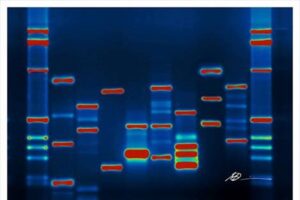 By Gerald L. Maatman, Jr., Jennifer A. Riley, and Tyler Z. Zmick
By Gerald L. Maatman, Jr., Jennifer A. Riley, and Tyler Z. Zmick
Duane Morris Takeaways: On May 1, 2023, the U.S. Court of Appeals for the Seventh Circuit issued one of only a handful of decisions that have been released regarding the Illinois Genetic Information Privacy Act (“GIPA”). In Bridges v. Blackstone, Inc., No. 22-2486, 2023 WL 3165218 (7th Cir. May 1, 2023), the Seventh Circuit affirmed the District Court’s dismissal of Plaintiffs’ GIPA claims based on Plaintiffs’ failure to allege that Defendant “disclosed” or was “compelled to disclose” their statutorily-protected genetic information. Similar to its more well-known counterpart – the Illinois Biometric Information Privacy Act (“BIPA”) – liability under the GIPA could potentially result in “astronomical” damages awards and may represent an increasingly important Illinois law in the privacy space.
GIPA Background
Enacted in 1998, the GIPA was designed to prevent employers and insurers from using genetic testing data as a means to discriminate for employment or insurance underwriting purposes.
To further that goal, the statute places restrictions on the ability to release “genetic testing and information derived from genetic testing.” Specifically, the GIPA provides that “genetic testing and information derived from genetic testing is confidential and privileged and may be released only to the individual tested and to persons specifically authorized, in writing in accordance with Section 30, by that individual.” 410 ILCS 513/15(a). Section 30, in turn, states that subject to certain exceptions, “[n]o person may disclose or be compelled to disclose the identity of any person upon whom a genetic test is performed or the results of a genetic test in a manner that permits identification of the subject of the test, except to . . . the subject of the test.” 410 ILCS 513/30(a).
Like the BIPA, the more widely-known privacy statute, the GIPA allows “[a]ny person aggrieved by a violation” of the statute to collect liquidated damages “for each violation” in the following amounts: (1) for negligent violations, $2,500 or actual damages, whichever is greater; or (2) for intentional or reckless violations, $15,000 or actual damages, whichever is greater. 410 ILCS 513/40. Like the BIPA, prevailing GIPA plaintiffs can also recover reasonable attorneys’ fees and costs.
Case Background
In Bridges, the Plaintiffs sent their DNA samples (obtained through at-home test kits) to Ancestry.com, a genealogy company. Years later, Defendant Blackstone, Inc. purchased Ancestry.com for $4.7 billion in an all-stock acquisition. Plaintiffs subsequently filed a putative class action against Blackstone in July 2021, alleging that its acquisition of Ancestry.com resulted in a violation of the GIPA.
After removing the complaint to the U.S. District Court for the Southern District of Illinois, Blackstone moved to dismiss on the basis that Plaintiffs failed to sufficiently allege a claim for relief under the GIPA.
The District Court agreed, holding that Plaintiffs failed to state a GIPA claim because they did not adequately allege that Blackstone “compelled” Ancestry.com to disclose Plaintiffs’ genetic data under Section 30 of the GIPA. The District Court agreed with Blackstone that “compel[ing]” the disclosure of genetic information necessarily requires something more than receipt or obtainment, yet Plaintiffs alleged only that Blackstone “may have been entitled to request or receive information from Ancestry in connection with the[] acquisition.” Bridges v. Blackstone Grp., Inc., No. 21-CV-1091, 2022 WL 2643968, at *4 (S.D. Ill. July 8, 2022).
The Seventh Circuit’s Decision
The Seventh Circuit affirmed the District Court’s dismissal of Plaintiffs’ GIPA claim under Rule 12(b)(6).
Regarding the District Court’s reason for granting Blackstone’s motion to dismiss, the Seventh Circuit held that it need not answer the question “over whether GIPA liability can attach to a company like Blackstone that allegedly receives protected information, rather than discloses that information,” because Plaintiffs “have failed to state a claim regardless.” Id. at *2.
The Seventh Circuit agreed with the District Court that it is not plausible to infer that “a run-of-the-mill corporate acquisition, without more alleged about that transaction, results in a compulsory disclosure within the meaning of Section 30.” Bridges v. Blackstone Grp., Inc., No. 22-2486, Order at 4 (7th Cir. May 1, 2023) (“All we can say with certainty about Blackstone’s all-stock acquisition of Ancestry is that a change in ownership occurred – nothing more.”).
Implications for Employers
One of only a few cases to have interpreted the statute, the Bridges decision indicates that a company is not subject to liability under the GIPA based solely on its acquisition of another company that may be in possession of genetic data.
Nonetheless, Bridges serves as a reminder to Illinois employers that collect genetic information, medical histories, and/or conduct “health screenings” as part of their application processes about the importance of complying with the GIPA.
The GIPA’s statutory text mirrors the BIPA’s text in important (and potentially concerning) ways, including that (i) a plaintiff can likely sue under the GIPA regardless of whether an actual injury is alleged; and (ii) following the Illinois Supreme Court’s logic as applied to the BIPA in Cothron v. White Castle, 2023 IL 128004 (Ill. Feb. 17, 2023) (see here), statutory damages may accrue under the GIPA each separate time a company “disclose[s] or [is] compelled to disclose” genetic data protected by the GIPA. Thus, it is possible that plaintiffs will file increased numbers of GIPA class actions in Illinois courts in the coming months and years.
